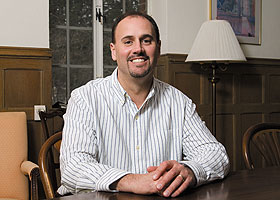  |
| HOME | THIS ISSUE | CALENDAR | GRANTS | BACK ISSUES | < BACK | NEXT > |
More research needed to improve care for older adults with cancerby Colin Poitras - February 17, 2009 |
||||
| The nation’s health care system will face significant challenges in the coming decades, as the number of individuals living with cancer rises dramatically along with the aging of the baby boomers, according to Keith Bellizzi, assistant professor of human development and family studies in the College of Liberal Arts and Sciences. Understanding the special needs of older adults with cancer and how the disease and related treatment impacts their physical, emotional, and social health is an area that deserves immediate exploration, he says. The issues surrounding cancer and aging are garnering international attention. Bellizzi recently served as guest editor for a special supplement of the journal Cancer that addressed the topic. The supplement, Aging in the Context of Cancer Prevention and Control: Perspectives from Behavioral Medicine, was released in December. Evidence-based practice Only with more immediate research will appropriate prevention efforts, screening, treatment approaches, post-treatment survivorship, and end of life care be put in place to serve this rapidly growing population, the supplement says. The single greatest risk factor for cancer is age. More than 60 percent of all malignant cancer diagnoses in the U.S. occur in people age 65 or older. Currently, there are an estimated 6.5 million adults age 65 or older in the U.S. who have had cancer. That number is expected to rise as the country’s baby boomer population ages and the number of men and women age 65 and older – currently about 36.8 million – doubles by the year 2030. Due to advances in medical science, cancer is no longer a uniformly fatal illness. Approximately 43 percent of older cancer survivors are expected to live for 10 years or more, and about 17 percent will survive for 20 years or more after their initial diagnosis, according to recent estimates. Need for research He says there is growing consensus that researchers and clinicians need to take a multidisciplinary approach, incorporating perspectives from geriatrics, oncology, behavioral medicine, and public health to ensure the best quality care.
Bellizzi cites two recent reports that warn of a looming shortage of adult oncologists and geriatricians due to expected retirements and a lack of new specialists to replace them. “Two pressing questions that need to be addressed are: 1) Who and how will we care for the growing population of older individuals with cancer, many of whom will also have competing health conditions, and 2) what are the unique physical, mental, and social issues they face,” Bellizzi says. “Regrettably, research has not kept pace with this growing population.” Critical issues Some critical issues facing the country’s growing population of older cancer survivors are:
|
| ADVANCE HOME UCONN HOME |

